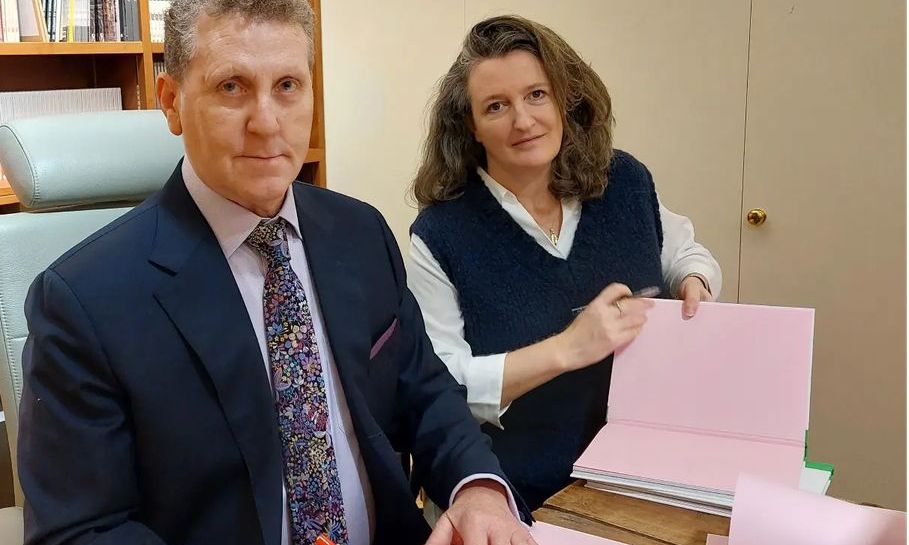Erin Lawlor with David Anfam at a book signing in 2023
Photo: Instagram
David Anfam, scholar, gentleman, wordsmith, epicurean, died last Wednesday (21 August) in London. So long-standing and wide-reaching have his achievements in the field of art history been that it is hard to comprehend that he was still only 69 at the time of his passing.
Certainly I personally can’t recall a time when I wasn’t aware of his work. His book on Abstract Expressionism for the Thames and Hudson World of Art series became a staple from its first publication in 1990. Then, over the following years, his continued explorations of 20th-century American art, from his catalogue raisonnée of Mark Rothko (1998)—almost a decade in the writing—to his important work at the Clyfford Still Museum, both prior to and after its opening in 2011, cemented his reputation as an essential figure in the field.
An alumnus of the Courtauld Institute (his PhD dissertation under John Golding was on the work of Still), he was very much an old-school scholar, rigorous and considered, with a love and respect for the written word that was always evident in his own extensive and varied production, as well as during has stint as a commissioning editor at Phaidon. He worked over the course of his life with any number of major institutions and galleries, curating shows such as the hugely ambitious survey of Abstract Expressionism held at the Royal Academy in London in 2016. He was from the earliest days a constant and loyal supporter and friend of the Rothko Museum in Daugavpils, Latvia. He also taught and spoke regularly.
David worked closely with artists, writing and curating for contemporaries such as Lynda Benglis and Bill Viola, and most recently Piero Dorazio. He was hugely supportive of a younger generation of painters, myself included. Constantly and carefully looking, he would reach out online when an artist’s work caught his attention. Equally he never hesitated to show up in support of those artists he championed when it mattered, and he travelled extensively to that end to the last.
I was privileged to finally meet David just before the pandemic—one last studio visit before lockdown for both of us—and we stayed in touch over the strange year or so that followed, bonding over painting, of course, but also a shared love of T. S. Eliot, and then, less happily, our concurrent cancer diagnoses during those isolated months.
In the studio, David presented a sartorially improbable but immediately affable figure, and his care in response to my work was both generous and considered. The text he subsequently wrote for my exhibition at Vigo Gallery last year, was, when it came, classic David—an erudite and precise pulling together of myriad cultural threads, the footnotes almost as long as the text, and each delightfully personal in tone.
David had become an avid texter in recent years—he seemed to enjoy the immediacy of this written dialogue, particularly as he became more hard of hearing. In between our occasional dinners I would receive brief updates on his trips—to his beloved Italy, to New York, Mexico and of course Daugavpils. He seemed at times perplexed by both the current art market and gallery scene, but took as much delight as ever in people, in good food, in very specific white wines, and in an obsessive re-organising of his book collection.
He had a peculiar love of precious stone, and painting on precious stone, and an almost child-like pleasure in all things James Bond. Yet despite his many interests, and his very many friends, David clearly profoundly, and daily, missed his life-partner Fred, whose memory and support he often evoked.
I dined with David one last time at the start of summer—he was just back from Venice, in good humour, full of projects, and typically avidly curious about his fellow guests and all aspects of their lives. His bright mind was constantly seeking connections through and across disciplines.
It is this curiosity and attentiveness, gentleness and generosity of spirit, that, beyond the extraordinary body of scholarship and writing that David leaves, I will remember.

